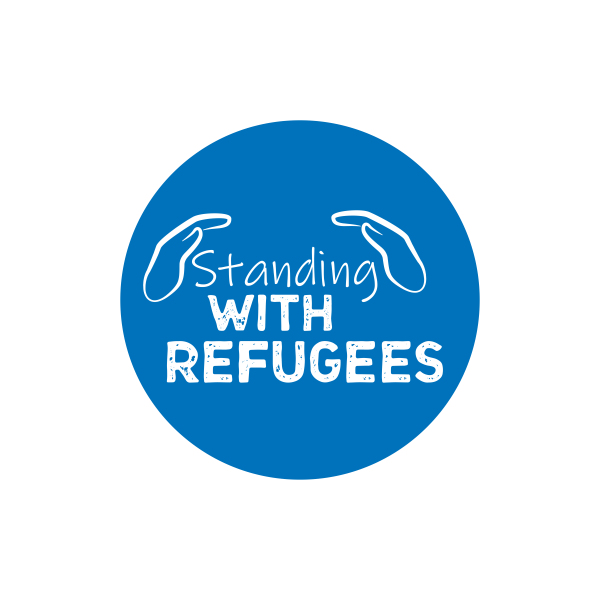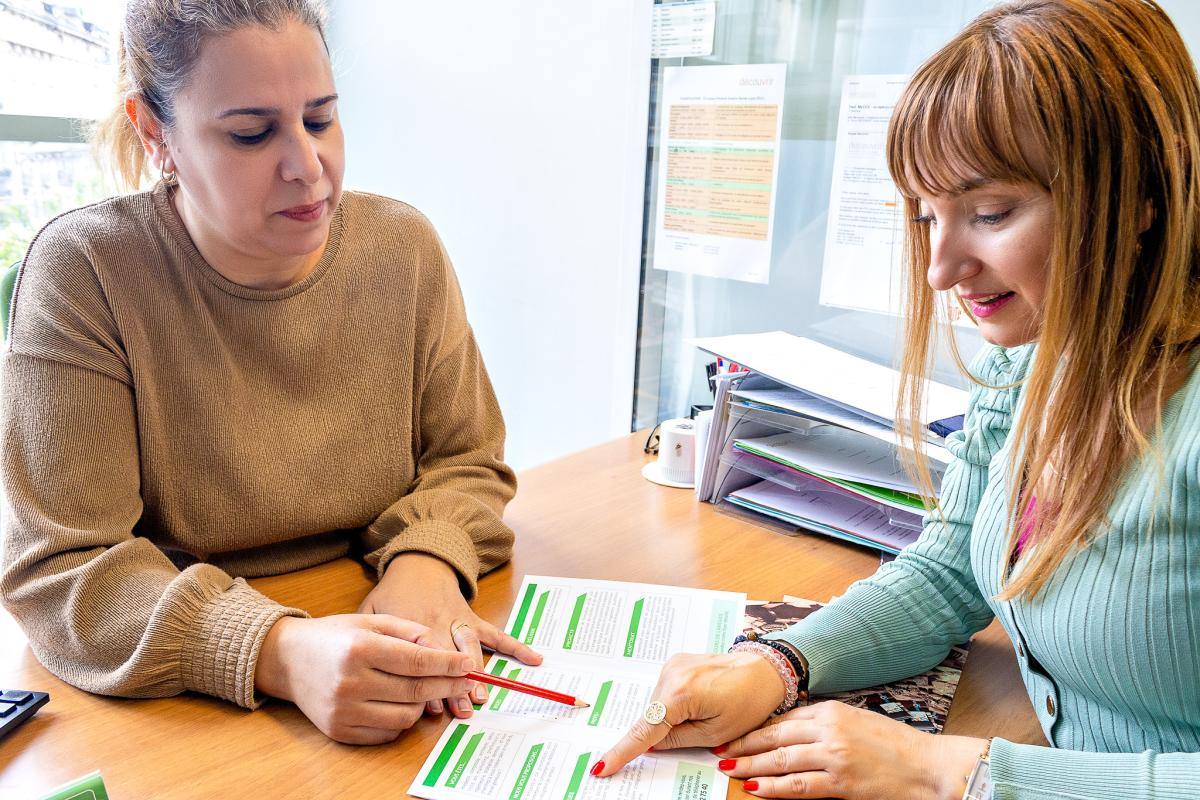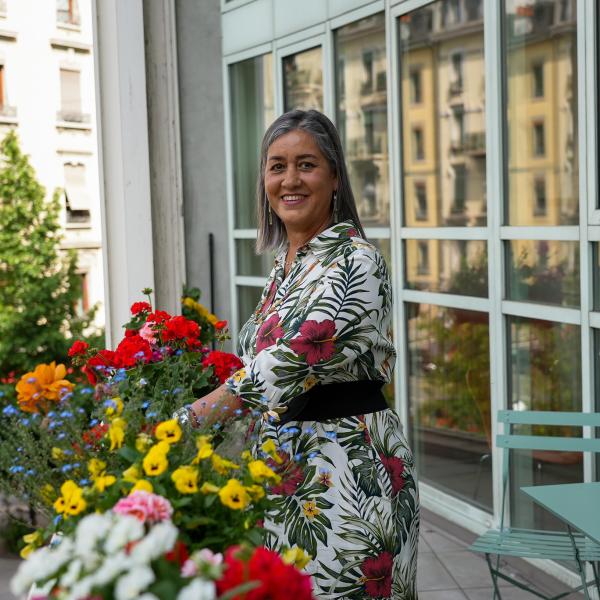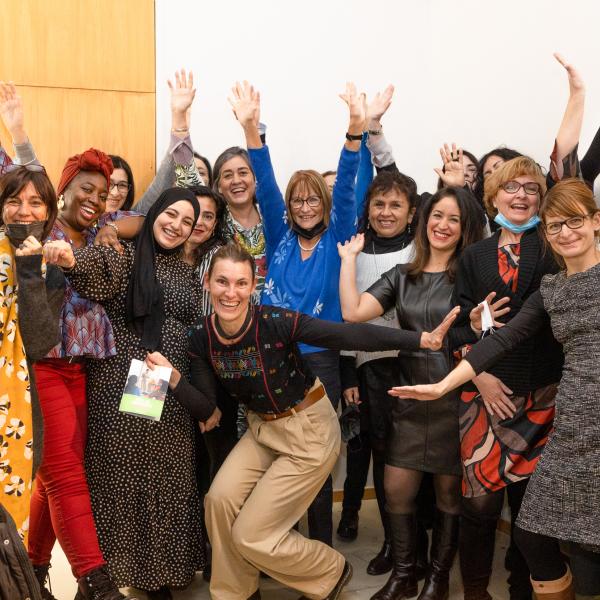
When the Swiss Foundation for UNHCR, Switzerland for UNHCR, was created, one of its goals was to raise awareness on refugee issues in Switzerland. We believe that a great way to achieve this is to publish a series of articles highlighting various local initiatives and actors who act on behalf of refugees and asylum-seekers. Standing with Refugees features the work of individuals, like you and me, who help people who were forced to flee their country and came to Switzerland.
In our eleventh article, we met with Rocio Restrepo, Founder and Director of the découvrir organization.
The association was founded in 2007 to help qualified refugee or migrant women overcome obstacles to integration, such as the non-recognition of diplomas and experience, not speaking the language and the lack of a network, among others.
The découvrir organisation was founded to fully and usefully support and guide migrant women. I myself have experienced how difficult it is to overcome obstacles when you are on your own!
It wasn't a choice, but rather an imperative. We women have our own struggles, for example, issues of underemployment due to juggling family and work life, and corporate of acknowledgement and recognition, etc.
When I arrived in Switzerland, I was invisible! People spoke to my husband as if I wasn't even there. This made me realise how important it is to take women into consideration, and the first step is through supporting them. Please note that this doesn't mean that men don't encounter complications in their integration, which is why we also offer services for them. But in reality, women make up 85% of our members. This is probably also because women are more supportive of each other, more “community-minded”.

We have several means to help them overcome the obstacles, both individually and within companies and organisations.
On an individual level, we carry out an initial assessment of the situation in order to evaluate whether or not the person is able to continue with their profession in Switzerland.
We also provide practical, 360-degree support in terms of getting their qualifications recognised, from completing the paperwork, translating it, to following up on the response and, when necessary, helping to find funding. Depending on the response, we guide the person on the basis of the official recognition, or on a change of career path.
For the “+profiles”, i.e. highly qualified people, we assist them with their job applications in way that is in keeping with the Swiss job market. Our ProAct programme is a proactive approach to professional integration. We provide tools, advice and useful links to help them structure a career plan here in Switzerland, along with training and coaching sessions for those wishing to embark on a new career path.
We also offer English and French language courses.
We also rely heavily on professional networks, which are vital in Switzerland. We therefore work with companies and organisations. Here, you have to learn how to grow and manage this network, which in other countries is something that comes naturally. In Switzerland, there is a whole process, with its own codes, to be understood and which we consolidate during our networking evenings attended by HR people, business leaders and our members to bring them together. This is another example of the importance of bringing women together, to meet each other, to show them that they are not alone. Mentoring is part of this, with more and more companies playing the role of mentor for qualified migrant women.

We therefore help people to validate, complete or renew their professional experience, but in a realistic way. Our objective is to connect them with the reality of the Swiss working world and their own potential.
I don't have one, but several observations!
-
Firstly: It takes between four and five years for a qualified refugee or migrant woman to find her real place in Switzerland. Just learning the language takes at least a year, plus a lot of networking, because that's the only thing that works, as well as recognition of experience or retraining. There's a lot to do!
-
Secondly, the sooner a woman has that support, the sooner she will be integrated. The more time that passes, the more she will lose confidence, become depressed, and run the risk of giving up.
-
Thirdly, faced with the difficulties, and sometimes the impossibility, of finding a job in their field, more and more women are retraining and becoming entrepreneurs, with between five and 15 projects a year at découvrir.
-
And fourth: Women who take part in the mentoring programme, where the mentor makes his or her network available, are successful, with 60% of participants finding employment.

It takes between four and five years for a qualified refugee or migrant woman to find her real place in Switzerland.
This is in the pipeline, with an opening initially planned for 2022 but postponed because of the war in Ukraine and the need to integrate that country’s people. We are therefore aiming for 2023, and our team is ready.
I came up with the idea for the project shortly after I arrived in Switzerland, when I was at the University of Geneva doing a psychology course. I noticed that there was no organisation for integrating women and I spoke to a group of friends about this. One of them laughed and said: “What makes you think you’re going to give the Swiss any ideas?” How could I, a Latina, imagine proposing something innovative to a people who are years ahead of us? That was the gist of it.
Well, since 2007, découvrir has accompanied and supported more than 4,000 qualified refugee or migrant women! And 2020, in the midst of Covid, was our best year, with 130 women employed because companies were more willing to interact with us, to listen to us. And this resulted in a record number of hires.
In 2018, we really started to collaborate with companies and organisations because they are the main stakeholders in integration. The collaboration takes several forms such as the company coming to the association to talk with the women, opening its doors for a day, or mentoring migrant women as mentioned above, etc.
The challenge is making the jobs more flexible, and this is done in the job description. Requiring a C permit or European nationality, more than five years’ experience, being French mother tongue, etc., is discriminatory because, in practice, it is impossible.
Jobs should be published so that everyone can apply with the same chances of success. We try to bring this home to companies, and they react well!
Commitment demands time and, for women, this time is really precious. As individuals, coming to talk for an hour, about life, Swiss culture, the current regulations, their jobs, etc., many people think this isn't useful, when in fact it's extremely valuable for our people, it's not trivial. Donation is also a form of involvement.
For organisations and companies, holding an event, making a donation and being more flexible (as mentioned above), are very important points for us.
In September, our book recounting the journeys of 15 qualified migrant women will be published. Titled “Qualified migrants: fifteen women in search of recognition.” It is about successes as well as failures, to demonstrate the reality, which sometimes and unfortunately leads to a waste of skills.
Personally, I spent eight years trying to find my place, and even though I obtained ANOTHER university qualification here, I didn't find it! So I had to create it.